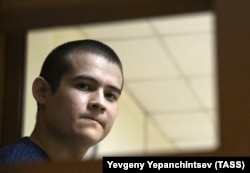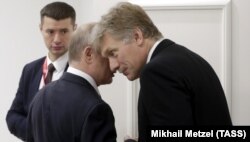In a move that adds further muscle to the Russian government’s ability to designate individuals or organizations as “foreign agents,” the Russian Federal Security Service has published a list of 60 types of non-classified information that could justify the label if released to the public.
Under the September 28, 2021 order, Russians would need to forget whatever they know about Russia’s armed forces or activities in outer space lest this information end up in the hands of foreign governments, international or foreign organizations, foreign individuals or those without citizenship.
The list is intended as a modification to the 2012 law that established the concept of “foreign agents” -- individuals or organizations that receive foreign funding and are engaged in what the government considers to be political activities. The classification requires financial audits and for media outlets to label their content as produced by a “foreign agent.”
Both Current Time TV and its parent, Radio Free Europe/Radio Liberty, have been designated “foreign agents,” a status they contest.
Over the past month and a half, ahead of Russia’s parliamentary elections, the Ministry of Justice has labeled as “foreign agents” some of the better-known sources of critical information about the government’s treatment of political opponents, including the TV station Dozhd (Rain), news sites Mediazona, IStories, and The Insider, plus the election monitor Golos (Vote) and police watchdog OVD-Info.
Despite complaints that the FSB order violates Russia’s media law authorizing the gathering and distribution of non-classified information and unduly restricts even innocuous public discussions, the Kremlin appears undeterred.
Have You Seen Tanks? But There Aren’t Any!
Distributing information that evaluates or forecasts how Russia’s military-political and strategic situation may develop ranks as the first item on the FSB’s list of “foreign agent” activities.
Experts’ assessments of whether the deployment of Russian troops along Ukraine’s border in April 2021 would cause war between the two countries appears to fall under this point.
As does information about the deployment itself.
In April 2021, international and Russian media outlets, including Current Time, learned from eyewitness videos on social media about the stationing of Russian troops and military equipment near Ukraine’s eastern border. Estimates of their number varied from the United States’ “tens of thousands” to Ukraine’s estimate of 100,000 to 120,000.
Under point three of the FSB’s September 28 order, however, “Information about the location, arms, and number of Russia’s armed forces” cannot be passed on to foreign organizations and citizens.
Whether that means that the FSB will investigate a person who uploads on the U.S.-owned Facebook videos of tanks passing under his or her window is difficult to predict.
Don’t Investigate Your Own Poisoning
The FSB likely would consider Russian opposition leader Aleksei Navalny’s December 2020 YouTube video, in which he named alleged FSB employees supposedly involved in his poisoning that year, a violation of the order’s ban on publicizing personal information about the special services’ employees or information about their activities.
Navalny made the video together with Bellingcat chief investigator Christo Grozyev, who is a Bulgarian citizen.
Under the FSB’s criteria, Navalny, if he were not already in jail, likely could be designated a “foreign agent.”
Forget About The Word ‘Hazing’
In October 2019, conscript Ramil Shamsutdinov shot dead eight fellow servicemen and seriously wounded two others in the closed town of Gorny in the Russian Far East’s Zabaikalye region. The defense attributed the crime to violence against Shamsutdinov as part of an army hazing.
Russian mass media actively covered the incident, but now sharing information about such practices as hazing or other problems inside the armed services could be considered a violation of the FSB’s 14th point, which forbids the public release of information about the morale of Russian troops or the psychological environment in which they work.
The agency’s sixth point identifies the release of information about a person having served in the military also as grounds for applying the foreign-agent label. Whether this means that an individual cannot even say that a given person serves in Russia’s armed services is unclear.
Explosions About Which Even State Media Cannot Report
In August 2019, explosions occurred from a fire at an artillery unit near the Siberian city of Krasnoyarsk. One person died and eight people were wounded. Thousands of local residents fled the area or were evacuated.
Those reporting about this emergency included state-run news agencies. But, under the FSB’s new order, giving out information about storage sites for weapons and explosives could qualify any organization as a “foreign agent.”
If a military warehouse explodes before their eyes, even state media will have to think carefully before reporting on it.
Roskosmos’ Non-Secret Secrets
Russians may take pride in their space industry, but the FSB order stipulates that disseminating information about the finances, annual reports, or priority programs of the state corporation Roskosmos, which oversees the country’s space program, is forbidden. Under its 37th point, the order also bans dissemination of information about “problems, including financial-economic” that hinder Roskosmos’ “development.”
That could affect any military correspondent, analyst, or Roskosmos official.
The state’s view of what constitutes classified information can defy definitions, critics say.
In 2020, Roskosmos consultant and former Kommersant and Vedomosti newspaper correspondent Ivan Safronov was accused of releasing such information to an alleged Czech spy about Russian arms sales. However, the defense claims that prosecutors still have not told them what is the actual information that they charge Safronov released.
Now, under the FSB’s order, even reporting about Roskosmos’ future plans could qualify an individual or organization as a “foreign agent.”
The Kremlin: Not Our Business
On October 1, presidential spokesman Dmitry Peskov claimed that the FSB had not consulted with the Kremlin about its order, and that the document does not fall under Russian President Vladimir Putin’s jurisdiction, the state-run RIA Novosti news agency reported.
Asked whether the intelligence agency’s foreign-agent order is dangerous for freedom of speech in Russia, Peskov advised “looking at the law-enforcement side” of such questions “and evaluating each specific case” as it happens.













Facebook Forum